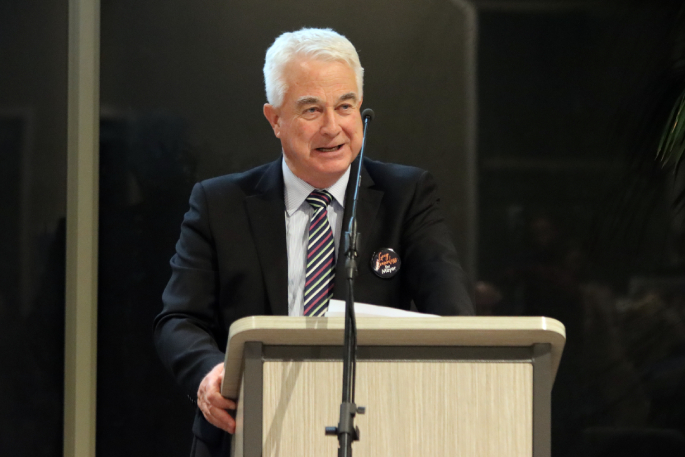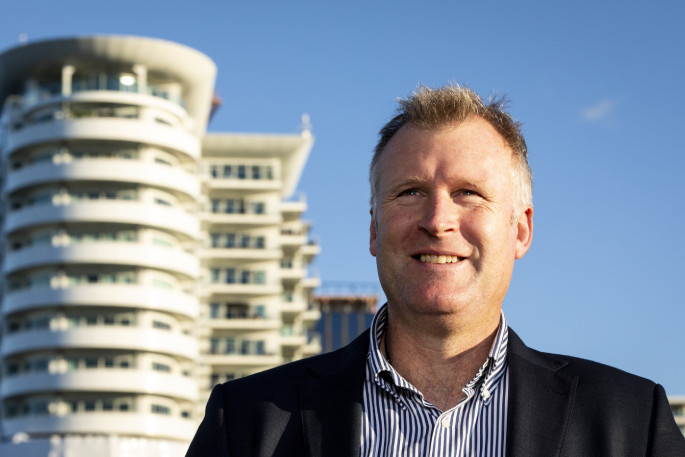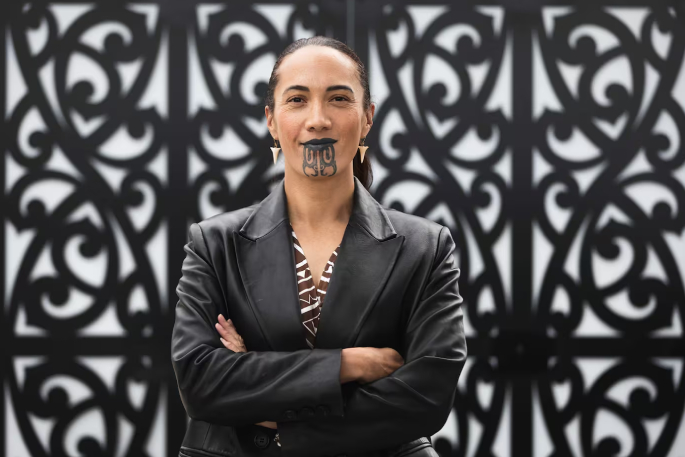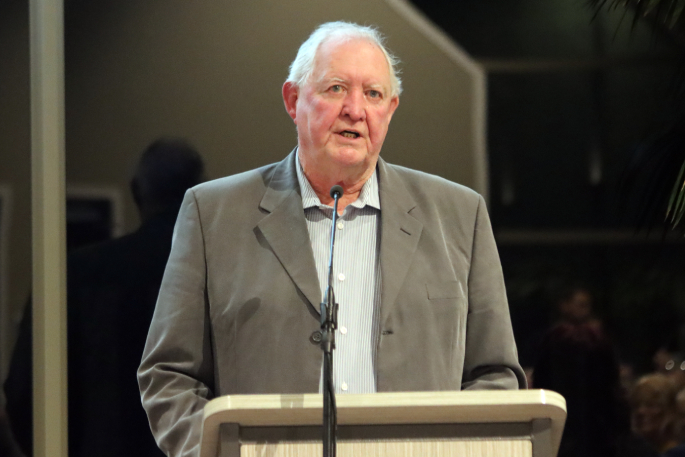The Government plans a suite of changes to boost housing supply, but three mayoral candidates say help is needed to pay for the necessary infrastructure.
Candidate Ria Hall has written to Housing Minister Chris Bishop asking for funding so Tauranga City Council can build the infrastructure required to allow for the new growth.
“Housing affordability is crippling Tauranga and the Government’s announcement to require all councils to free up and plan for housing intensification is a clear direction that this Government is taking housing seriously.”
The changes will allow for more housing intensification and require councils to enable mixed-use developments in cities.
Bishop has also set growth targets for tier 1 and 2 councils requiring them to zone for 30 years of housing demand.
Tauranga City, Western Bay of Plenty District and the Bay of Plenty Regional Council fall into the tier 1 category.
Councils will no longer be able to set minimum floor area and balcony requirements for houses and apartments.
They will also be prohibited from imposing rural-urban boundary lines in planning.
In light of Hall’s letter, Local Democracy Reporting asked mayoral hopefuls their thoughts on the new housing policy.
The 10 candidates that responded were mainly supportive of the changes but raised some sticking points.
 Former mayor Greg Brownless said high density housing was better located near parks. Photo: Alisha Evans/SunLive.
Former mayor Greg Brownless said high density housing was better located near parks. Photo: Alisha Evans/SunLive.
Greg Brownless said more details were needed and intensification was better located near reserves so large buildings didn’t adversely impact neighbours.
“The Government needs to assist with the necessary infrastructure so that current residents aren’t left to pick up the costs.”
Terry Leaming, aka Hori BOP, said there needed to be some regulation and he wanted to read the details fully.
“Unfortunately, when [the] government has left things to developers and the private sector to self-regulate invariably the taxpayer and or ratepayer has to clean up the mess.”
Donna Hannah said the changes promised abundant development opportunities, reduced land prices, and greater housing affordability.
But it was “crucial” to find out if the government would cover the cost of the infrastructure required to implement the changes.
She also supported the removal of minimum floor and balcony requirements.
This was something Anthony Goddard had concerns about because “they ensured quality living standards and should not be compromised”.
“While we need more housing, it’s crucial to maintain liveable and healthy environments.”
 Mahé Drysdale said intensification was the cheapest option for Tauranga to increase housing supply. Photo: Alex Cairns/Bay of Plenty Times.
Mahé Drysdale said intensification was the cheapest option for Tauranga to increase housing supply. Photo: Alex Cairns/Bay of Plenty Times.
Mahé Drysdale said getting rid of minimum sizes for apartments and balconies could generate more affordable housing, but there needed to be a balance to avoid unintended social problems and cost for the city.
“I don't agree with councils’ losing control over the urban/rural boundary limits.
“The Government needs to understand it’s not just the initial cost of infrastructure, but cities would need to service a wider footprint going forward, with urban sprawl being expensive.”
With Tauranga nearly reaching the city’s boundary already, intensification was the cheapest option from council’s perspective, he said.
Jos Nagels said abolishing the urban rural boundaries was “unacceptable” because it led to car dependency, urban sprawl-housing infestations, and food-producing land being paved and concreted, which was expensive and polluting.
“Housing intensification must firstly occur along arterial routes [that were] easily accessible to public transport/rail corridors.”
Tina Salisbury said unrestrained building on urban fringes risked poorly planned communities, environmental impacts, costly infrastructure, and strain on transport.
She opposed the growth targets because Tauranga lacked sufficient land.
“[Tauranga’s] limited greenfield sites aren’t sufficient to meet current Government requirements. I'm concerned about land banking's impact on housing prices, constraining market dynamics.”
 Ria Hall said the government is taking housing seriously. Photo Alex Cairns/Bay of Plenty Times.
Ria Hall said the government is taking housing seriously. Photo Alex Cairns/Bay of Plenty Times.
Hall said the new rules requiring mixed-use developments was also a positive step.
“We need to see more dispersed business opportunities to work in with local communities.”
Andrew Caie said housing unaffordability was a “a massive drain on the entire economy of Tauranga”.
“I am in favour of many of the changes – with intensification and mixed-used development being crucial in Tauranga’s quest to grow to afford itself.”
Tim Maltby said if the mixed developments were done well, housing costs would be reduced while providing more options.
“Not everyone wants a 3-bedroom house with a lawn to mow.”
He also wanted light industrial businesses to be included in the mixed-use developments.
 Chudleigh Haggett said the new rules must benefit the whole community, not just developers. Photo: Alisha Evans/SunLive.
Chudleigh Haggett said the new rules must benefit the whole community, not just developers. Photo: Alisha Evans/SunLive.
Chudleigh Haggett said councils must defend ratepayers right not to be living in a shadow, or for undesirables to populate high rises and affect their privacy and safety.
He said councils should still be responsible for the rules around intensification and setting minimum floor areas.
“Make [the rules] pertinent to Tauranga and its specific areas and their current vibe or atmosphere.
“There must be a benefit to the whole community, not just the developers.”
Voting for Tauranga's local election closes at noon on July 20.
The city will then return to elected representatives after being run by commissioners since 2021.
LDR is local body journalism co-funded by RNZ and NZ On Air.
*This story has been updated to include comment from Tina Salisbury and to correct the year the commission began to 2021.


.jpg)

7 comments
Protect rural
Posted on 12-07-2024 23:46 | By Ruth Woodward
Worst thing that could happen is to remove urban/rural boundaries. This will revert Western Bay to the mistakes of the past when ribbon rural development allowed houses and lifestyle blocks to spring up in the wrong places … reducing fertile agricultural land and causing major infrastructure problems. Surely we must learn from past mistakes!
Hmmm
Posted on 13-07-2024 10:11 | By Let's get real
I can't help wondering if we are seeing politically engineered disaster scenarios in our tiny speck of a nation.
Do we really have a housing "crisis" that miraculously appeared during a labour government or are we really seeing more people wanting to move to the cities from smaller towns.
Does anyone really believe that riding a pushbike, focusing on a few million livestock and banishing the use of fossil fuels in NZ will alter the climate...? We have a population of less than six million, for goodness sake.
In my opinion, we are looking for problems far too often, where for the vast majority of the population, there isn't a problem, much less a crisis.
We are New Zealand and not Los Angeles, London, Amsterdam,
Paris or Delhi and in the main our population growth has been reasonably consistent over many years. So where is the CRISIS.
@Let's get real
Posted on 13-07-2024 12:59 | By morepork
I agree with you about the "crisis". I covered this in another Sunlive thread: "Welcome to Tauranga. Now go home..." It is insane to expect us to provide housing for people who want to come and live here. Existing residents who can show a CONNECTION to Tauranga and are in need of housing (elderly, renting families, candidates who would be served by "State housing" in the past, homeless on a case by case basis, but all of whom have lived in Tauranga for some time, and have their support networks, school connections, etc. here), must have priority and be catered for long term. We shouldn't just build high rise apartment blocks, with no minimum areas, just because the government will help fund them, and fill them up with all comers. This happened in Auckland (and Shanghai...) and was/is a disaster. Caie and Hall are OFF my "possibles" list...
Overit
Posted on 13-07-2024 17:47 | By overit
And what does John Robson think, I dont see his name here.
Let’s hear from John Robson
Posted on 14-07-2024 08:43 | By Naysay
Why not ask those who have walked the walk . Robson has the facts on expenses and debt which we ultimately pay for . Stay in Tauranga be prepared to pay top rates Sit in traffic and live with your windows closed. The crisis here is we are full so activate other areas.
@Naysay
Posted on 14-07-2024 13:40 | By Let's get real
It takes more than one person to cause disruption, arguments and chaos. For the exact same reason that I will not be voting for all other former councillors, I have, and will, be ignoring any and all claims of "capabilities" from Mr Robson, Mr Brownless, Mr Guy, Mrs Salisbury et al.
Feel free to wave his flag as fervently as you wish.... Mr Robson et al had their chance and the results are millions of dollars of unwanted debt from an imposed political regime.
options
Posted on 19-07-2024 16:58 | By rotovend
seems to me if they are going to go higher it should be around Merivale, Parkvale etc as there a main road right there. Plus developers should be made to include public transport in their developments. Went on a small catamaran called a Kitty Cat. That would be perfect for Tauranga Habrbour as it can avoid mangroves and can take a bit of current OK Be worth looking into as we have a huge area of water
Leave a Comment
You must be logged in to make a comment.